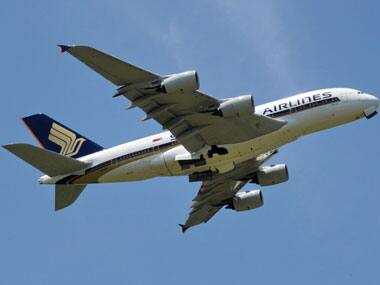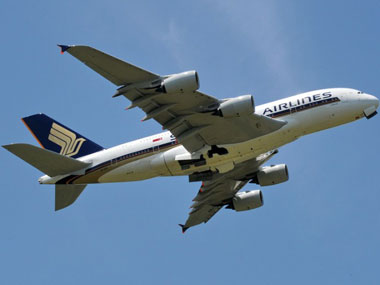[caption id=“attachment_675420” align=“alignleft” width=“380”] The initiation with Singapore could well mean that alongside the culmination of an equity partnership between Jet Airways and Etihad Airways in the near future, India could soften its stand towards a long standing request from UAE too.[/caption]
The initiation with Singapore could well mean that alongside the culmination of an equity partnership between Jet Airways and Etihad Airways in the near future, India could soften its stand towards a long standing request from UAE too.[/caption]
New Delhi: India and Singapore will begin talks early next month to amend and increase bilateral traffic rights when Civil Aviation Minister Ajit Singh is on an official tour to that country. These talks, if successful, will allow airlines of Singapore- Singapore Airlines, Silk Air and Tiger Airways - to offer more services from more Indian cities and increase the total number of seats on offer to Indians.
Similar increased traffic rights would be available for Indian carriers. But the timing of these talks is crucial. Ajit Singh has not entertained repeated requests from countries like Turkey and ethe UAE to increase seat entitlements or allow more seats per week to airlines from these countries but is keen to discuss the possibility with Singapore. Requests for reworking traffic rights have been pending from other countries too.
The initiation with Singapore could well mean that along with the culmination of an equity partnership between Jet Airways and Etihad Airways in the near future, India could soften its stand towards a long standing request from UAE too.
Singh had indicated earlier that even in the case of UAE, negotiations could be restarted since Indian carriers have reached the peak of seat entitlements. Dubai-headquartered Emirates Airline is already the largest foreign carrier from India and is seen in aviation circles as a keen rival to airlines like Singapore Airlines.
The ministry has been reluctant to increase rights of Middle Eastern carriers further since they already dominate the Indian skies.
A senior official in the Ministry of Civil Aviation told Firstpost that Ajit Singh will be in Singapore from April 2 to 4 and amending the bilateral air agreement between India and Singapore will be on the agenda for talks. “We are not saying we have decided to increase their seat entitlements. We are only saying that Singapore wants to rationalise the bilateral agreement, we are willing to hold talks”.
Impact Shorts
More ShortsThis official said the current bilateral agreement with Singapore allows carriers from both countries to offer 26,700 seats per week. “But the bilateral is structured in such a way that in some sectors it’s on the basis of number of seats, in some others on the basis of frequencies etc. Singapore wants to rationalise the bilateral”.
He said that Singapore is currently allowed to fly from 18 destinations in seven cities of India but now wants access to Pune and Madurai also besides more seat entitlements from the existing top seven Indian cities.
To a question on why requests from other countries like the UAE, Turkey etc were not being considered, he said airlines have just been asked to give in their route preferences overseas for next year and the Ministry will examine these in detail before deciding if it wants to reopen negotiations with other countries.
On Turkey this official said that no Indian carrier was willing to offer flights to that country and therefore all the rights with India were unused. Hence, there was no need to amend that bilateral for increasing flights.
Most of the airlines seeking additional rights - Turkish, Singapore, Qatar, Etihad and Emirates - are sixth freedom carriers. This means they carry Indian passengers to their own countries and offer them onward connections into Europe and Americas. This is what has prevented the Ministry from being liberal with enhancing traffic rights for some foreign airlines.
A recent report by aviation consultancy CAPA said the historical weakness of international services by Indian carriers means that close to 40% of Indian international traffic travels to its final destination via an intermediate offshore airport, with Middle East hubs capturing just over half of such flows.
But if Singapore can persuade Ajit Singh to be generous, the Middle Eastern nations may also stand a chance.
)